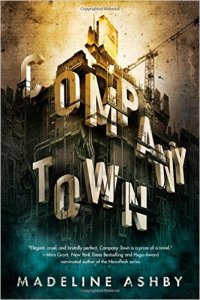Gary K. Wolfe reviews Madeline Ashby
Company Town, Madeline Ashby (Tor 978-0-7653-8290-0, $24.99, 256pp, hc) May 2016.
 The streetwise, working class bodyguard hired to protect a sheltered member of a wealthy family has been a staple of hardboiled fiction for decades, and you can see why: the class tensions that underlie the whole genre are brought to center stage, the decadence and unexamined privileges of the rich are easily parodied, and the value of a skilled kickfighter always seems to trump the arrogance of – well, a Trump. Violence is the great equalizer, just like it used to be in Westerns and just as it still is in a lot of SF. It’s also the central premise of Madeline Ashby’s Company Town, whose very title suggests the struggles between the owners and the owned, between corporate goals and individual ambitions. The title might just as well have fit any number of documentary films from the 1930s, but what gives Ashby’s novel its immediacy, and much of its considerable power, is the setting: an enormous, arcology-sized oil rig – actually five separate towers – off the coast of Newfoundland. The entire complex is in the process of being taken over by the wealthy Lynch family, and Go Jung-hwa, known simply as Hwa, is distrustful of a family that she suspects might have been involved in an explosion that killed her brother three years earlier. A half-Korean martial arts expert, Hwa’s job is providing security for the unionized sex workers on the rig, and she does it so well that she draws the attention of Daniel Siofra from the Lynch family, who hires her to protect Joel, the 15-year-old heir apparent to the family fortune.
The streetwise, working class bodyguard hired to protect a sheltered member of a wealthy family has been a staple of hardboiled fiction for decades, and you can see why: the class tensions that underlie the whole genre are brought to center stage, the decadence and unexamined privileges of the rich are easily parodied, and the value of a skilled kickfighter always seems to trump the arrogance of – well, a Trump. Violence is the great equalizer, just like it used to be in Westerns and just as it still is in a lot of SF. It’s also the central premise of Madeline Ashby’s Company Town, whose very title suggests the struggles between the owners and the owned, between corporate goals and individual ambitions. The title might just as well have fit any number of documentary films from the 1930s, but what gives Ashby’s novel its immediacy, and much of its considerable power, is the setting: an enormous, arcology-sized oil rig – actually five separate towers – off the coast of Newfoundland. The entire complex is in the process of being taken over by the wealthy Lynch family, and Go Jung-hwa, known simply as Hwa, is distrustful of a family that she suspects might have been involved in an explosion that killed her brother three years earlier. A half-Korean martial arts expert, Hwa’s job is providing security for the unionized sex workers on the rig, and she does it so well that she draws the attention of Daniel Siofra from the Lynch family, who hires her to protect Joel, the 15-year-old heir apparent to the family fortune.
But Hwa has other qualifications as well. A facial disfigurement creates a ‘‘natural dazzle’’ that makes it hard to see her on camera, and she’s virtually the only fully organic person on the rig, lacking any of the various body modifications or augmentations that might make her hackable. The skill with which Ashby introduces her various SF elements – climate change, cyborgization, eventually even multiple timelines, a generation starship, and a Singularity – and insinuates them seamlessly into the plot, is worthy of the best Heinlein (who also wrote of working class conflicts and valorized street competence), and it soon becomes apparent that a lot more is at stake here than the safety of the precocious and brilliant Joel. But is Joel really the one who needs protection? A series of increasingly gruesome murders seem to be targeting Hwa’s own friends and acquaintances, with growing hints that she herself is the real target.
Hwa is a terrific character, if a somewhat familiar one: tough, violent, suspicious of everyone, and yet vulnerable and lonely and incredulous at the thought that anyone might actually care for her – the sort of character who would break your knees if you called her spunky, but who finds genuine affection puzzling. At first, she seems to buy a bit too easily into the world of privilege offered by the Lynch family, which itself seems more sympathetic than expected: Daniel and Joel both seem to develop a genuine concern for her, which she doesn’t quite know how to return. It turns out, the family patriarch Zachariah Lynch has entire closets full of ominous secrets, and Daniel – who isn’t even a family member – has a bizarre backstory of his own, while Joel is too young and too smart to be easily co-opted by his family’s darker values. Will those darker values prevail, or will the Lynch family be undone? Is any sort of future in this grim industrial setting really viable? As a brutal murder mystery in a very detailed and convincing SF setting, Company Town never falters in its pacing, and introduces its more SFnal complications with considerable skill. Even though we’ve met folks like this before, and even though some readers might find the ending a bit orchestral, it’s a terrific ride at the hands of a storyteller as skilled in her own way as Hwa is in hers.







